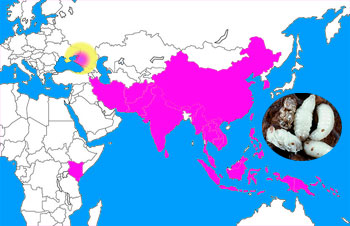BEE HEALTH
NEW THREAT TO EASTERN EUROPEAN AND CAUCASUS APIARIES
July 13th, 2024
 (Espacio Apícola - July 13, 2024) Tropilaelaps spp. is a mite native of Southeast Asia. The original host of Tropilaelaps mercedesae was the Asian giant honey bee, which makes open air honeycombs, Apis dorsata and from this it would have passed to Apis cerana, which makes honeycombs in cavities, in Thailand, Pakistan, and Myanmar, A. florea and A. indica in India, A. laboriosa in Vietnam, and A. dorsata in Palawan, the Philippines, as described by Panuwan Chantawannaku and others in a paper published in 2018.
(Espacio Apícola - July 13, 2024) Tropilaelaps spp. is a mite native of Southeast Asia. The original host of Tropilaelaps mercedesae was the Asian giant honey bee, which makes open air honeycombs, Apis dorsata and from this it would have passed to Apis cerana, which makes honeycombs in cavities, in Thailand, Pakistan, and Myanmar, A. florea and A. indica in India, A. laboriosa in Vietnam, and A. dorsata in Palawan, the Philippines, as described by Panuwan Chantawannaku and others in a paper published in 2018.When Apis mellifera shares the same areas where those species that are natural hosts live, it becomes infected and, the same article cited indicates that Tropilaelaps spp. is more harmful than Varroa destructor in some Southeast Asian countries. However, this is not the case in South Korea where Woo and Lee reported it in 1993, nor in Krasnodar, in the southwest of Russia, in the European continent, near the coasts of the Black Sea, the border with Ukraine and Georgia close to Caucasus as described by Anna Brandof, Victoria Soroker and others in a work published last May in the Journal of Apicultural Research.
The latter raises great concern due to its proximity to the native region of Apis mellifera caucasica, so appreciated in Western beekeeping. This area is between two confirmed foci of Tropilaelaps in Apis mellifera, the Islamic Republic of Iran to the south and southern Russia to the north, between the Black Sea and the Caspian Sea (see map). According to the comments that a renowned American beekeeper and biologist received during a beekeeping conference held in Azerbaijan, Azeri beekeepers told him that it was only a matter of time until the mite parasitised their colonies and from the rest of Europe.
Countries are obliged to notify the occurrence of Tropilaelaps for the Organisation internationale des épizooties (OIE), currently the World Organization for Animal Health (WOAH), hence the importance of obtaining bee genetics from safe and certified bee farms free of this parasite. In addition to the "mechanical" damage caused by parasitosis, Tropilaelaps harbors deformed wing virus (DWV) and black queen cell virus (BQCV).
Tropilaelaps spp. It inhabits both tropical and temperate climates. It is currently present in countries where its original host is not native (map).
Information generated by "Espacio Apícola" the Argentine Beekeepers' Magazine apicultura.com.ar


 Versión en Castellano
Versión en Castellano